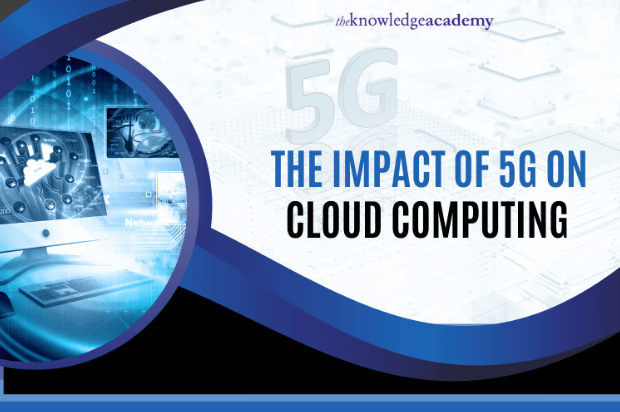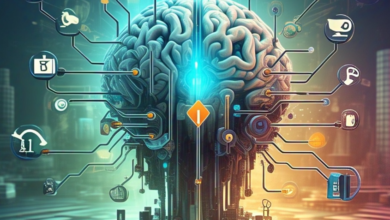The Impact of 5G on Cloud Computing

“Did you know by 2035, the worldwide introduction of 5G will boost the global economy by $13.2 trillion?” Not only about higher internet connections, 5G is transforming sectors, and cloud computing is leading the way in this change.
Imagine a world in which remote work becomes more effective, ultra-fast internet rates enable flawless real-time data processing, and new technologies like IoT and artificial intelligence fully realise themselves. This isn’t a distant future—it’s happening now, thanks to 5G. So, how exactly is 5G impacting cloud computing, and why should you care? Understanding What is Cloud Computing and Cloud Computing Training is essential to leveraging these advancements, ensuring you stay ahead in the evolving technological landscape.
Table Of Contents
- A Quick Look at 5G
- Cloud Computing Meets 5G: A Perfect Match
- Conclusion
A Quick Look at 5G
First of all, what exactly is 5G? Consider five generations of wireless technology as five G. It’s meant to offer vast network capacity, ultra-low latency, and shockingly rapid data speeds. Imagine downloading a full HD movie in seconds or finding almost no lag during a high-quality video conference call. Sounds excellent, indeed. 5G promises more advanced technologies and methods at your fingertips.
Cloud Computing Meets 5G: A Perfect Match
Cloud computing lets us save and retrieve data and apps over the Internet instead of on local servers or personal devices. Many companies now run their operations mostly on this technology, which provides cost reductions, scalability, and flexibility.
What results when these two powerhouses, cloud computing and 5G, unite?
Speed and Efficiency: A Quantum Leap
Among its most fascinating effects is the extreme speed and efficiency gain of 5G in cloud computing. Data transfer rates with 5G maybe 100 times quicker than those with 4G. Data can be uploaded, handled, and downloaded almost instantly.
Consider this: Large datasets from the cloud are easily accessible by businesses, drastically lowering downtime and increasing output. For instance, a manufacturing organisation adopting cloud-based software to track and manage its operations in real time will have fewer delays, enabling more effective and simplified procedures. Interesting?
Ultra-Low Latency: Real-Time Experiences
Data travel time from one point to another is known as latency. With 5G, latency is lowered to only a few milliseconds. This very low latency transforms everything for cloud computing by allowing real-time data processing and analysis.
Consider the healthcare sector, where 5G will greatly help telemedicine and remote surgery. Minimal lag allows doctors to obtain patient data from the cloud in real time and perform operations with robotic help. This accuracy and speed might save lives.
Edge Computing: Bringing the Cloud Closer
Edge computing is a concept you know of? Rather than distributing data to a centralised cloud server, it’s all about processing it nearer where it’s generated. Through its required speed and connectivity, 5G improves edge computing.
In autonomous cars, for example, vehicles create enormous volumes of data that must be instantly processed to make split-second judgements. This data can be handled at the network’s edge with 5G and edge computing, guaranteeing faster response times and safer driving conditions.
Enhanced IoT Capabilities: A Connected World
The Internet of Things (IoT) is fast expanding, consisting of billions of devices linked to the Internet. With up to a million devices per square kilometre supported by 5G, IoT finds the ideal companion in this technology.
Imagine a connected smart city in which the cloud controls waste management systems, parking meters, and traffic lights. Data from these Internet of Things may be rapidly and effectively sent with 5G, enabling real-time monitoring and control.
Improved Security: Safeguarding Data
Data security consistently ranks highest in cloud computing. Fascinatingly, 5G could improve security protocols. Using better encryption and safer connections, the technology lowers the possibility of data leaks. Faster data transfer rates also enable quicker deployment of security updates and patches, maintaining systems against the most recent threats.
Imagine a financial institution conducting transactions and storing private consumer information on cloud computing. More robust encryption techniques and faster, more safe data transfer made possible by 5G help the institution. This implies that transaction data is guarded from manipulation or interception. Hence, any security flaws can be fixed almost right away.
Cost Savings: Optimising Resources
The efficiency of 5G can result in notable cost savings for companies employing cloud computing. Faster data transit and processing imply more efficient resource use. Businesses can cut demand for costly infrastructure improvements and save on bandwidth expenses.
Take a media corporation depending on cloud storage and streaming services. With 5G, the business may minimally buffer and delay streamlining high-quality material to users. By handling peak traffic, this enhanced performance lowers the demand for extra servers and data centres, therefore reducing running expenses.
Conclusion
5G offers faster speeds, lower latency, expanded IoT capabilities, better security, and cost savings, significantly affecting cloud computing. We are only starting to explore the possibilities of 5G as it spreads worldwide.
Are you as thrilled about the direction of 5G and cloud computing as I am? Consider The Knowledge Academy to enhance your skills in cloud computing. What do you believe cloud computing will be the most significant game-changer enabled by 5G?



